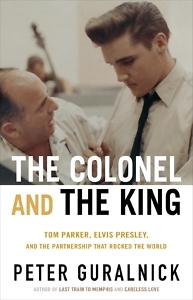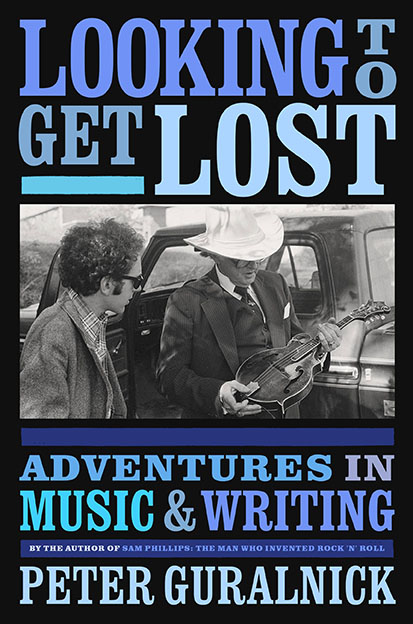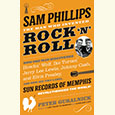Saving the Colonel from the Mythmakers
Elvis’ biographer takes on the stories of his legendary manager
Facts tend to lose the battle with myths, but Peter Guralnick keeps fighting the good fight for the truth in The Colonel and the King: Tom Parker, Elvis Presley, and the Partnership that Rocked the World.

As Presley himself said during a June 9, 1972 press conference at Madison Square Garden, “The image is one thing and the human being is another. It’s very hard to live up to an image.”
The Colonel and the King is a fascinating scroll through the letters and the mind of Presley’s manager, Colonel Tom Parker. Guralnick also provides a short biography of Parker, which is a grand Horatio Alger tale in itself.
“Tom Parker was a legend among his fellow managers and promoters not just for his positive energy but for his extraordinary attention to detail,” Guralnick writes. Parker’s letters offer “a reading-between-the-lines glimpse into Colonel’s inner life.”
The book refutes some common assumptions about Presley and Parker. Let’s start with a big one, Presley’s widely dismissed films. The lore is that Parker manipulated Presley into throwing away his artistic credibility through tepid roles in — to be nice about it — lightweight musicals. If you’ve seen Clambake (1967) or Kissin’ Cousins (1964), you know what I’m talking about. Presley had a lot to give, and many of the scripts of his movies weren’t worthy of his talent.
Countering this, Guralnick publishes a letter from Parker to a William Morris agent suggesting Presley be cast in roles that would have gone to James Dean, who had recently died in a car accident. “This boy, ELVIS PRESLEY, has the same type of personality, and talents along the line of James Dean,” Parker writes in 1955, before Presley made Love Me Tender (1956), his first film. Parker’s letters from later eras return to this theme.
In fact, Guralnick points out that Presley gave solid performances in a couple of dramatic roles — Flaming Star (1960) and Wild in the Country (1961) — but the movies didn’t do well. The need to succeed pushed Presley to return to the light musicals that consistently made money, and Parker negotiated ever greater fees for those performances.
 Similarly, the claim that Presley was worked to death by Parker just doesn’t hold up. Addiction to pills was his undoing, as is documented in a previous book by Guralnick, Careless Love. Other myths addressed in The Colonel and the King include the allegations that Parker took 50 percent of Elvis’ earnings; Elvis never toured internationally because Parker, a Dutch immigrant, had no passport; and Elvis continued performing in Las Vegas near the end of his career because of Parker’s own gambling debts. All these nuggets are half-truths at best, more often completely mistaken. If you are an Elvis fan, you may already know the real stories behind these myths. But then again you might not, and it’s handy to have all of the fallacies addressed in one place.
Similarly, the claim that Presley was worked to death by Parker just doesn’t hold up. Addiction to pills was his undoing, as is documented in a previous book by Guralnick, Careless Love. Other myths addressed in The Colonel and the King include the allegations that Parker took 50 percent of Elvis’ earnings; Elvis never toured internationally because Parker, a Dutch immigrant, had no passport; and Elvis continued performing in Las Vegas near the end of his career because of Parker’s own gambling debts. All these nuggets are half-truths at best, more often completely mistaken. If you are an Elvis fan, you may already know the real stories behind these myths. But then again you might not, and it’s handy to have all of the fallacies addressed in one place.
Guralnick speaks to the reader directly in the book’s prologue: “Surrender yourself, if you can, to their unremediated dream, set aside the myths that have grown up around them both, and give yourself over to an empathetic (and I don’t mean credulous or uncritical, just human) reading of history.”
A word about Guralnick for those unfamiliar with him. His two-volume Presley biography — Last Train to Memphis and Careless Love — remains the definitive account of Presley’s life, even though both books were published in the 1990s. He has also published biographies of singer Sam Cooke and Sun Records owner Sam Phillips, as well as several anthologies of his writing on blues, soul, and country musicians. In short, you are in good hands when Guralnick writes about Presley. There is no one better versed on the topic.
Now, perhaps it’s time for new editions of his Presley opus, incorporating the insights from his later books on Phillips and Parker. That would be a lot of work, but all this information and insight belong together and would only enrich the tale of the Mississippi boy who ushered in the rock ‘n’ roll revolution.
It’s one heck of a story.

Jim Patterson is a Nashville freelance writer whose work appears often on the United Methodist News website. He has been a reporter for The Associated Press in Nashville and senior writer and public affairs officer for Vanderbilt University.


